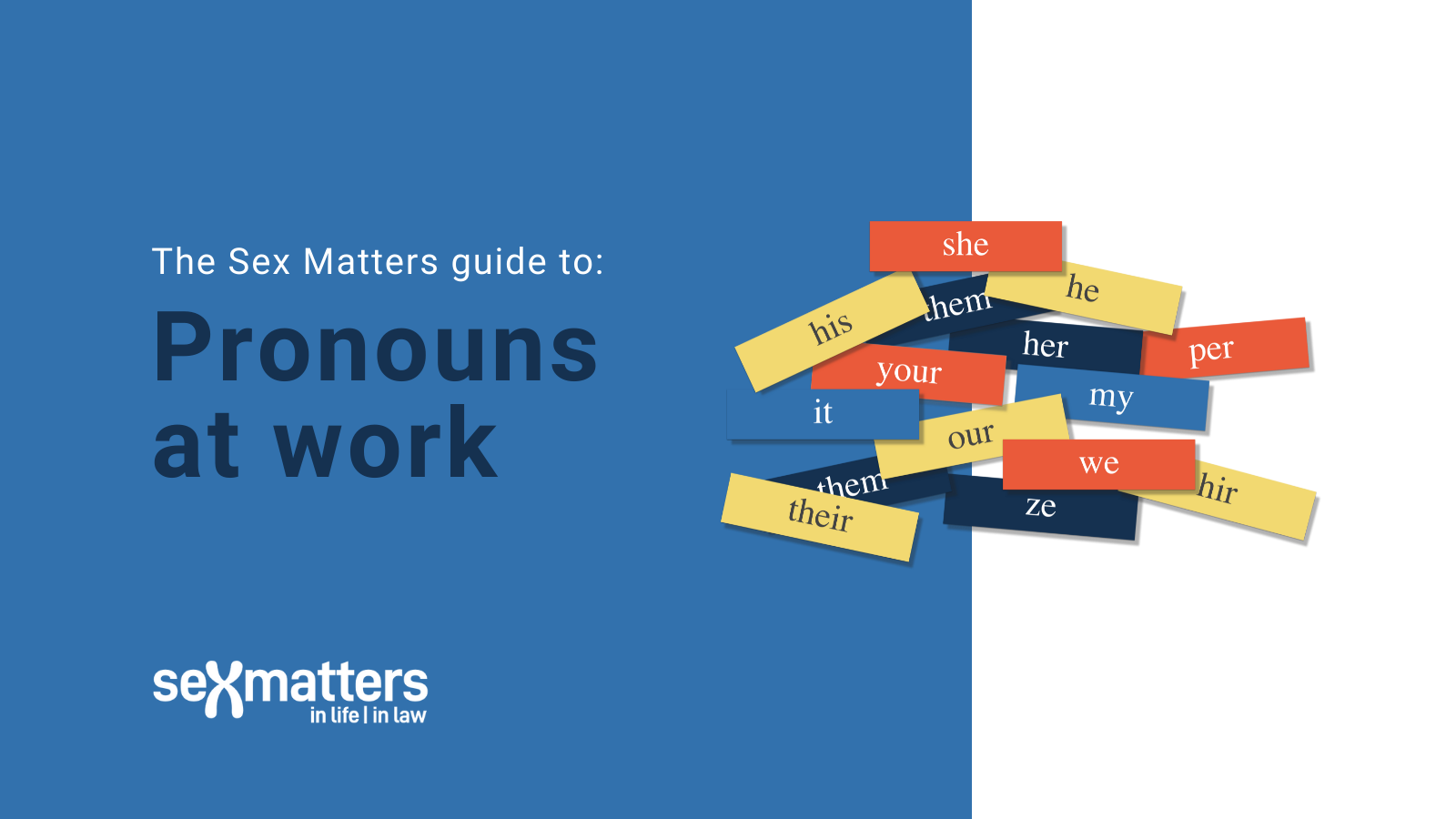Pronouns at work
You often ask us what you should do when a workplace asks you to ‘state your pronouns’, in your email signature or during introductions in meetings. We explain the laws surrounding the issue and what to do if this new ritual makes you uncomfortable.

Believing in gender-identity ideology and being gender-critical are both protected by the Equality Act under the category “religion or belief”.
Stating pronouns is part of a belief system and one not everyone is signed up to. Employers are used to accommodating a range of different beliefs among their staff and customers. Similar to religion: some colleagues may observe prayer or dietary rituals and we respect these without actively taking part ourselves if we don’t share their beliefs.
What you need to know
Do I have to “state my pronouns” at work?
No. There haven’t been any legal cases on this yet but organisations encouraging their employees to announce their pronouns are imposing the manifestation of a belief on them and can put people who don’t share the belief in gender-identity ideology at a disadvantage. It could even amount to indirect discrimination.
You might have any number of reasons for rejecting a call to “state your pronouns”. These may be rooted in your religious beliefs, philosophical beliefs (including feminist convictions), sexual orientation, or simply discomfort at being required to participate in a ritual based on a belief you don’t share. All of these are protected characteristics under the Equality Act.
People who consider themselves transgender but who haven’t taken steps to transition and are not ‘out’ can also find being asked for their pronouns upsetting.
What should I say if I don’t want to?
Remember that it’s not necessary for people to state their pronouns in order to facilitate polite and respectful interaction, in the workplace or anywhere else.
The simplest thing to do is to politely decline. Refrain from putting pronouns in your biography or your email signature and don’t announce them at meetings. If invited to, say “No thank you” and if asked why, say something bland like “It is not a practice I follow”.
If you want to discuss the issue with your organisation and think they would be open to listening, you could follow up with a short note to the relevant manager, and include our guide. But you don’t have to – your polite refusal should be enough.
If a colleague said “No thanks” to a glass of champagne at an event, which could be for any number of reasons including religion, health or pregnancy, their refusal ought to be accepted without question. It should be the same with stating personal pronouns.
Do I have to use other people’s preferred pronouns?
It depends. It might be a reasonable expectation to refer to colleagues, customers or students with the pronouns and title they prefer, or at least to avoid using pronouns or language that refers to their sex if it makes them uncomfortable.
Calling someone “he” or “sir” repeatedly to their face when they wish to be called “she” or “madam” when there’s no good reason to do so is likely to be harassment, so policies to avoid this are likely to be justified. A better approach might be to use a person’s name and try to avoid personal pronouns altogether.
Employers should recognise that using a person’s preferred pronouns out of courtesy doesn’t mean you believe they are the opposite sex or that you agree to share changing, washing, toilet or sleeping accommodation with them. These are all separate questions with different justifications.
What if I have a safeguarding concern?
Although using someone’s preferred pronouns can be polite, it can also be a safeguarding issue.
Many schools have adopted guidance from lobby groups which tells them that if a child identifies as transgender they should change their name and pronouns without telling parents, if the child requests it. Teachers may be told they should refer to a child as “he” in class but as “she” when talking to parents.
Keeping secrets with children is a safeguarding risk, and schools should work with families.
If you’re concerned, use your school’s whistleblowing policy, which should be on their website. Raising the issue is no guarantee that it will be taken seriously, but it is worth doing, in writing, referring to safeguarding issues.
Can I still use the word “mother”?
Some organisations which promote gender-identity ideology have started policing language far beyond pronouns. “Misgendering” has been expanded to include any sex-based words such as wife, sister and mother.
Official policies should not be written in the language of gender-identity believers and extreme constraints on language may not be in line with the Equality Act 2010.
Read the full briefing, which goes into more detail on the law and includes some interesting case studies. Or download our two-page summary:
Sign up for our mailing list to get future reports and updates on the work Sex Matters is doing.
